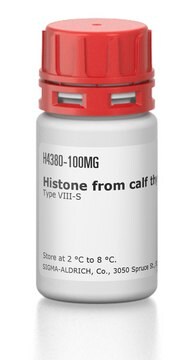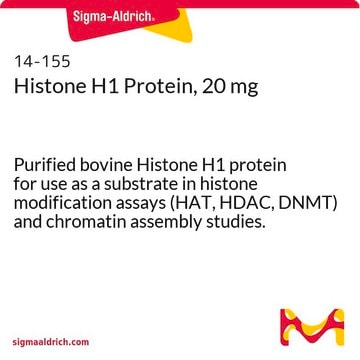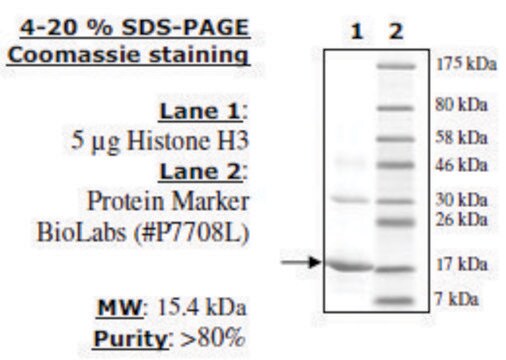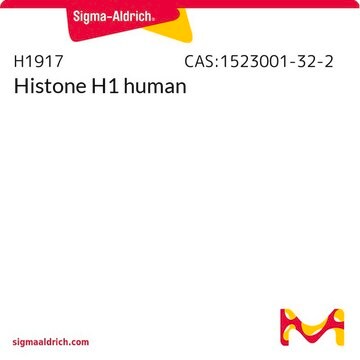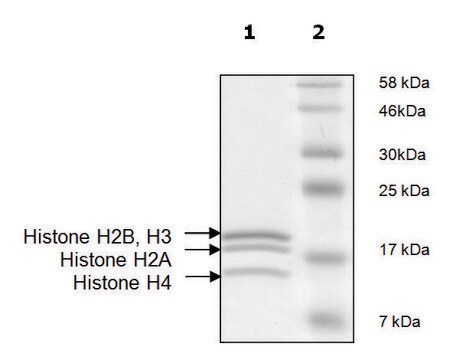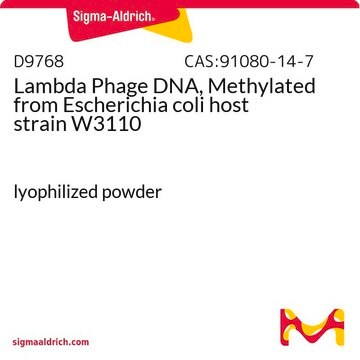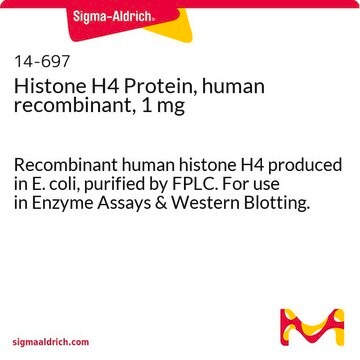H9250
Histone from calf thymus
Type II-A, lyophilized powder
Synonym(s):
histone type VIII-S
Sign Into View Organizational & Contract Pricing
Select a Size
All Photos(2)
Select a Size
Change View
About This Item
CAS Number:
Beilstein/REAXYS Number:
1895465
MDL number:
UNSPSC Code:
41106305
NACRES:
NA.51
Recommended Products
biological source
bovine (calf) thymus
Quality Level
type
Type II-A
form
lyophilized powder
application(s)
cell analysis
storage temp.
2-8°C
Looking for similar products? Visit Product Comparison Guide
General description
Histones are octameric proteins containing H3, H4, H2A and H2B. It is the core protein around which DNA is wound forming the nucleosome structure. The core histone proteins contain globular domains. Each protein is composed of basic amino acids at its N-terminal. The H2A has an extra amino acid at its C-terminal end forming a histone tail. The nucleosome structure is stabilized by the linker histones during chromatin condensation.
Application
Histone from calf thymus has been used:
- in methyltransferase reaction mixture for methyltransferase assay
- in in vitro binding assay, to explore the potential binding of the MORF4 (mortality factor on chromosome 4) - related gene on chromosome 15 (MRG15) chromo domain with histone
- in in vitro coculture assays, to stimulate liver resident Kupffer cells
Biochem/physiol Actions
The core histones are involved in histone-histone interactions and maintains the organization of the nucleosomal DNA. The histone tail helps in forming higher-order nucleosomal structures. The overall structure and action of chromatin fiber is regulated by histone modifications.
Features and Benefits
Do not confuse Sigma "Type" designations with the "Fraction" designations used by Luck and co-workers.
Preparation Note
Unfractionated whole histone
Storage Class
11 - Combustible Solids
wgk_germany
WGK 3
flash_point_f
Not applicable
flash_point_c
Not applicable
Choose from one of the most recent versions:
Certificates of Analysis (COA)
Lot/Batch Number
Don't see the Right Version?
If you require a particular version, you can look up a specific certificate by the Lot or Batch number.
Already Own This Product?
Find documentation for the products that you have recently purchased in the Document Library.
Customers Also Viewed
Histones activate the NLRP3 inflammasome in Kupffer cells during sterile inflammatory liver injury
Huang H, et al.
Journal of Immunology, 191(5), 2665-2679 (2013)
Structure of human MRG15 chromo domain and its binding to Lys36-methylated histone H3
Zhang P, et al.
Nucleic Acids Research, 34(22), 6621-6628 (2006)
Juan-Carlos Cabrera et al.
Glycobiology, 20(6), 775-786 (2010-03-05)
Plant cell walls undergo remodeling during growth and development and are the first target of many invading pathogens. Acidic pectin (homogalacturonans) binds calcium and forms chain dimers called egg boxes and even multimers at higher calcium ion concentrations. Chitosan, the
Yannick Tauran et al.
Scientific reports, 9(1), 5816-5816 (2019-04-11)
By means of Silicon Nano Tweezers (SNTs) the effects on the mechanical properties of λ-phage DNA during interaction with calf thymus nucleosome to form an artificial chromatin analog were measured. At a concentration of 100 nM, a nucleosome solution induced a
Histones and histone modifications
Peterson CL, et al.
Current Biology, 14(14), R546-R551 (2004)
Our team of scientists has experience in all areas of research including Life Science, Material Science, Chemical Synthesis, Chromatography, Analytical and many others.
Contact Technical Service